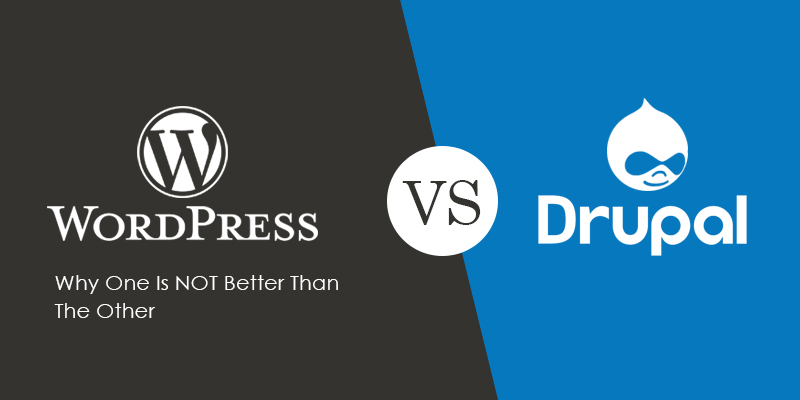WordPress Vs Drupal – Why One Is NOT Better Than The Other

UPDATE - You must be quite familiar with all the amazing features that Drupal 6 and 7 had offered. Now with the release of Drupal 8, there are more than 200 new features designed which has made Drupal even more compelling, user-friendly and rich. The best part is Drupal 8 is mobile first and it supports new technologies like AngularJS with headless Drupal. With Drupal 8's extensive features like CKEditor, Views, multilingual, configuration manager, responsive images and many others, it has come a long way by overcoming its drawbacks. Moreover, due to its much simplified look and feel, Drupal has emerged to become a tough competitor for WordPress and thus making it difficult to choose between them.
As a hardcore Drupal developers, you might expect us to fight for Drupal being the top content management system (CMS). This is where we beg to differ - We have nothing against WordPress, really. Basically, they are two different content management systems catering to two different types of clients.
In fact, we get a lot of customers who request functionalities that are better suited for the WordPress platform. Since we’ve received so many requests, we’ve actually formed a relationship with Noble Image, who can provide a much better WordPress solution (check out their Sacramento web design company landing page – Awesome stuff).
Who Will WordPress And Drupal Cater To?
If you have an awesome product or service that requires a website to showcase it, then WordPress is fantastic first choice. WordPress doesn’t require any complex technical knowledge to update content on a site. The simple back-end structure helps you update information, as and when needed.
Further, if you want a host a publishing website that requires handling multiple accounts, then WordPress CMS is darn good solution. You can create unique users and link it with the appropriate permission to perform seamless functions. WordPress gives the option to moderate your site, keeping you in charge.
On the contrary, if you have a creative agency and need to protect your designs and ideas, then you’ll 100% need a secured portal – And Drupal is the best at security. Similarly, if you have a record company that uploads lots of copyrighted material into your website, then Drupal should be your ultimate choice. Granted, you will need the help of professional developers to develop the website, but the security features make it worthwhile.
Now that we have seen examples on how the clients vary for WordPress and Drupal, we can get into the specifics of each platform to better understand the two different CMSs.
Drupal And WordPress – Both Survive With A Strong Community
Building your website in any one of the CMSs will ensure you have the support of their wonderful community. The WordPress CMS accounts for millions of websites on the internet, making their WordPress Community larger with plenty of people to help with support. However, even if the Drupal Community is a little smaller, there is a core organization which makes it stable and organized. The love each organization shows is inspiring and gives us comfort knowing that help is always a click away.
Going Mobile With Your CMS
With Google making responsive websites practically mandatory, it's essential that all websites are mobile friendly. While both CMSs cater to mobility, Drupal fares better because its core features are responsive in nature. But, for the average website owner, it's nothing major that would affect the functionality or the ranking of a WordPress website.
To all content saavy people, making content updates and edits on the go is made simple with both CMSs. WordPress has their awesome mobile app which helps ease the process with faster connectivity and user friendly UI. But, Drupal is super responsive making up for the lack of app.
Future Updates
WordPress sites are easy to update and new updates are made available every 2-3 months. However, Drupal updates are not as simple to incorporate. There are generally two kinds of Drupal updates - Core and security. While the security update is easy, core updates might prove difficult and require some level of technical help.
Customizing Your Site
Both Drupal and WordPress can be customized according to user's needs. With WordPress, there are thousands of ready made themes to create a great looking website quickly. With Drupal, there aren’t as many ready made options, so you’ll probably need some Drupal developers to design the website. The launch of Drupal 8 might change this but for now, WordPress wins when it comes to out-of-the-box designs.
Why Is Drupal More Secured?
Drupal’s modules go under strenuous scrutiny before they’re released for public use, whereas WordPress plug-ins are made available without such filtering. This makes WordPress websites susceptible to injected codes and other security threats, which can be very dangerous. Just check out this article: A Client’s WordPress Site Was Hacked & SEO Rankings Lost – Here’s How We Fixed It.
Overall Take Home Message
Big organization with a bigger budget will do well with Drupal CMS, as Drupal developers build the site from scratch, making it easy for them to develop their websites around their business process. Oppositely, WordPress will serve well for small businesses, who need to have their website up and running within few working days.
Both CMS have their pros and cons. The choice of a particular CMS should solely depend on the kind of website and business process one requires. Want to know more about how Drupal? Contact DrupalPartners for a free consultation.
Contact Our Drupal Migration Team